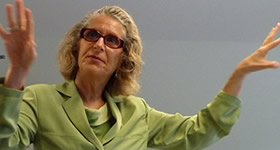I just watched MILK on DVD. You know, the Sean Penn film about Harvey Milk, the first “out” gay man elected to public office in the U.S.
Amazing. Inspiring. Moving. And shameful. Shameful that electing an openly gay person was even an issue. Shameful that electing a woman is an issue. Shameful that electing a person of color is an issue.
Shame on all of us. But more about that later.
It was the 70s. The 1970s. As I watched the film, I kept asking myself: “Where was I? Why wasn’t I aware and engaged in this issue then?”
Where was I in the 70s? The Vietnam War was my issue then. Remember the draft? Young men figuring out how many college credits they had to take to retain their student deferrments. My family was against the war before the movement gained force in the U.S. My French father kept asking: “The French were in Indochina (yes, that’s Vietnam) for 20 years and never won. Why would the U.S. think it can win?”
My brother was of age and we were real worried. My father declared French citizenship for all of us. We talked about leaving the country as a family.
My soon-to-be husband was in Vietnam. I remember one letter he sent me: “Today I killed a boy Philippe’s age.” Philippe is one of my brothers. He was 12 years old then.
I remember when Bill came back from Nam. I remember the first years of our marriage and what Vietnam did.
I was consumed with Vietnam in the 70s. I was in my early twenties and I was also figuring out my life.
What would I do when I couldn’t find a teaching job, all I had ever wanted to do? Being a secretary in the Department of Fisheries and Wildlife at Michigan State University helped put food on the table but wasn’t fulfilling. Then I discovered the nonprofit sector for my own life…and here I am today.
And as the years passed, the consciousness instilled by my family became ever more present in my life. Social justice…but mostly injustice.
Invisible privilege instead of just talking about the disadvantaged. It’s one thing to acknowledge disadvantage – injustice when we see it. You know, the poor, for example. And the frequent elements of being poor – which may include race / ethnicity, lack of education, and lack of opportunity. (By the way, how do we expect people of diverse socioeconomic status to obtain higher education with the unreasonable and outrageous cost of education these days? That’s an example of injustice.)
Invisible privilege. That’s what we don’t recognize and talk about enough. Let’s talk about me and my invisible privilege. I’m a white, heterosexual, well-educated, affluent woman. I win on all counts – except gender.
In every country in the world, in every state in the U.S., it’s a disadvantage to be a woman. It’s an advantage to be male in our world. That’s invisible privilege if you don’t recognize it and talk about it.
Back to me: While it’s a disadvantage to be a woman, look at my other advantages, my privileges. I was born white, a big privilege in the U.S. (And please, don’t tell me that now that we’ve elected Barack Obama, race is no longer an issue in the U.S. That’s just bullshit.) My parents paid for my education. I’m affluent, not wealthy, but affluent. Sure, I worked for it. But I had the education and the parental support and the race — all those invisible privileges — to help me become affluent.
And I’m heterosexual. A really big advantage. A big piece of privilege. I feel guilty about my unearned privilege. I’m enormously angry that I live in a world, a country, a state where social injustice is woven into our social and political and economic systems.
Where was I when Harvey Milk was fighting? Not there. Not even sufficiently aware. I regret that.
But I’m here now. I’m real clear about our social injustice towards gender and race / ethnicity and sexual orientation.
I’m fighting now. I’m speaking out now. Because silence is consent.
There’s a wonderful story put forth in the book A Theory of Justice by John Rawls (1971), retold in some speech Warren Buffet gave once. And I’ve modifed it somewhat for me.
Here goes:
Let’s say it was 24 hours before you were born, and a genie appeared and said: “What I’m going to do is let you set the rules of the society into which you will be born. You can set the economic rules and the social rules, and whatever rules you set will apply during your lifetime and your children’s lifetimes and even the lifetimes of your grandchildren.”
And you’ll say, “Well, that’s great. I get to define what kind of world I want to live in.” But you’re smart too. You ask: “What’s the catch?”
And the genie says, “Here’s the catch. You don’t know if you’re going to be born poor or rich, of color or white, female or male, homosexual or heterosexual.”
Now what rules do you want to have?
I was born a white, heterosexual woman. I was born into a family with college-educated parents with good jobs. And so much more…
I am privileged…except for my gender.
What rules do I want? I want the same rules for everyone. I want equity. I want social justice for all.
Thank you, Harvey Milk, for who you were and what you did.
I’m here now. I’m speaking out. I will not be silent. That’s where I am today. And tomorrow, too.

